Boardman J., Hammond N.G. L. The Cambridge Ancient History Volume 3, Part 3: The Expansion of the Greek World, Eighth to Sixth Centuries BC
Подождите немного. Документ загружается.

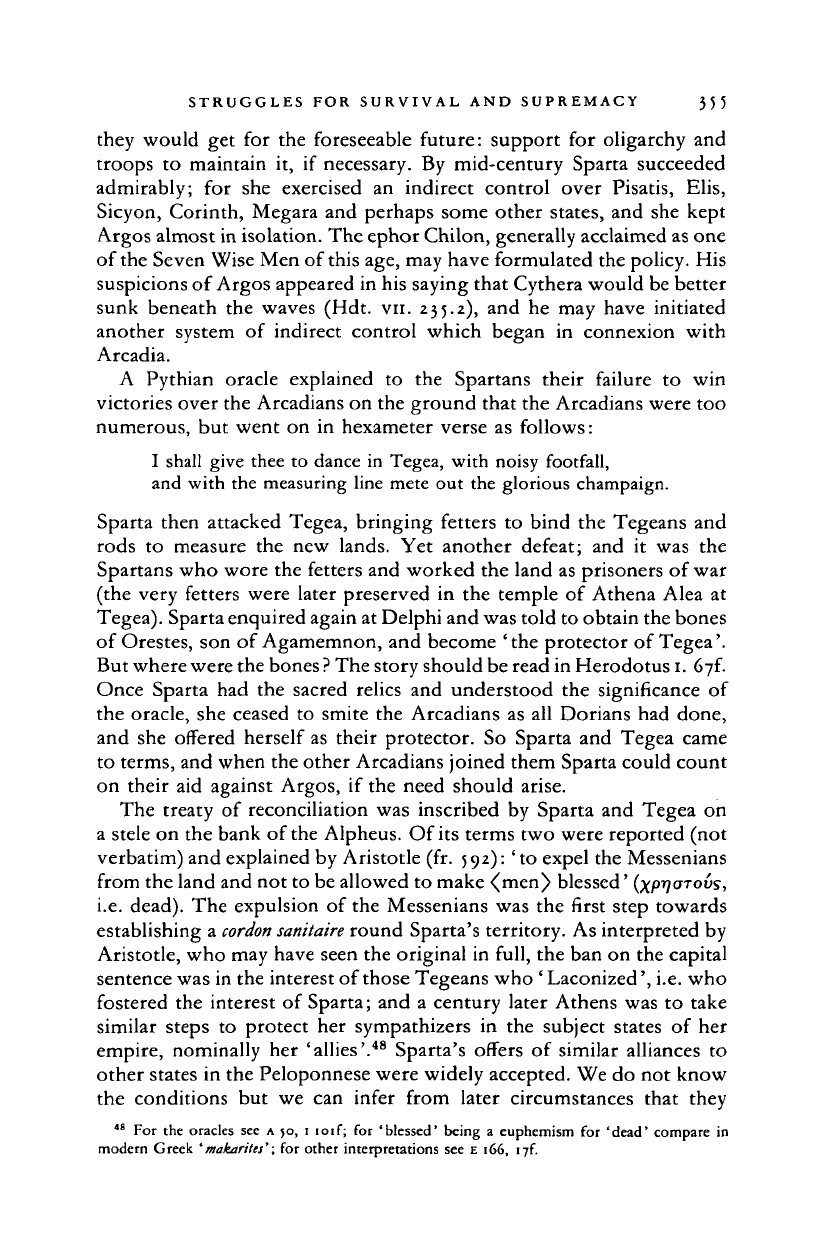
STRUGGLES FOR SURVIVAL AND SUPREMACY 355
they would
get for the
foreseeable future: support
for
oligarchy
and
troops
to
maintain
it, if
necessary.
By
mid-century Sparta succeeded
admirably;
for she
exercised
an
indirect control over Pisatis, Elis,
Sicyon, Corinth, Megara and perhaps some other states, and she kept
Argos almost in isolation. The ephor Chilon, generally acclaimed as one
of
the
Seven Wise Men of this age, may have formulated the policy. His
suspicions of Argos appeared in his saying that Cythera would be better
sunk beneath
the
waves (Hdt.
vn.
235.2),
and he
may have initiated
another system
of
indirect control which began
in
connexion with
Arcadia.
A Pythian oracle explained
to the
Spartans their failure
to win
victories over the Arcadians on the ground that the Arcadians were too
numerous, but went
on in
hexameter verse
as
follows:
I shall give thee to dance
in
Tegea, with noisy footfall,
and with the measuring line mete out the glorious champaign.
Sparta then attacked Tegea, bringing fetters
to
bind the Tegeans and
rods
to
measure
the new
lands.
Yet
another defeat;
and it was the
Spartans who wore the fetters and worked the land as prisoners of war
(the very fetters were later preserved
in the
temple
of
Athena Alea
at
Tegea). Sparta enquired again at Delphi and was told to obtain the bones
of Orestes, son
of
Agamemnon, and become 'the protector of Tegea'.
But where were the bones? The story should be read in Herodotus
1.
6yf.
Once Sparta
had the
sacred relics
and
understood
the
significance
of
the oracle, she ceased
to
smite the Arcadians as all Dorians had done,
and
she
offered herself as their protector.
So
Sparta
and
Tegea came
to terms, and when the other Arcadians joined them Sparta could count
on their
aid
against Argos,
if
the need should arise.
The treaty
of
reconciliation was inscribed
by
Sparta and Tegea
on
a stele on the bank of the Alpheus. Of its terms two were reported (not
verbatim) and explained by Aristotle (fr. 592): 'to expel the Messenians
from the land and not to be allowed to make (men) blessed' (xprjorovs,
i.e. dead). The expulsion
of
the Messenians was the first step towards
establishing a
cordon sanitaire
round Sparta's territory. As interpreted by
Aristotle, who may have seen the original in full, the ban on the capital
sentence was in the interest of those Tegeans who 'Laconized', i.e. who
fostered the interest
of
Sparta; and
a
century later Athens was
to
take
similar steps
to
protect
her
sympathizers
in the
subject states
of
her
empire, nominally
her
'allies'.
48
Sparta's offers
of
similar alliances
to
other states in the Peloponnese were widely accepted. We do not know
the conditions
but we can
infer from later circumstances that they
48
For the
oracles
see
A
50, 1
ioif;
for
'blessed' being
a
euphemism
for
'dead' compare
in
modern Greek 'makariles'';
for
other interpretations see E 166,
iyf.
Cambridge Histories Online © Cambridge University Press, 2008
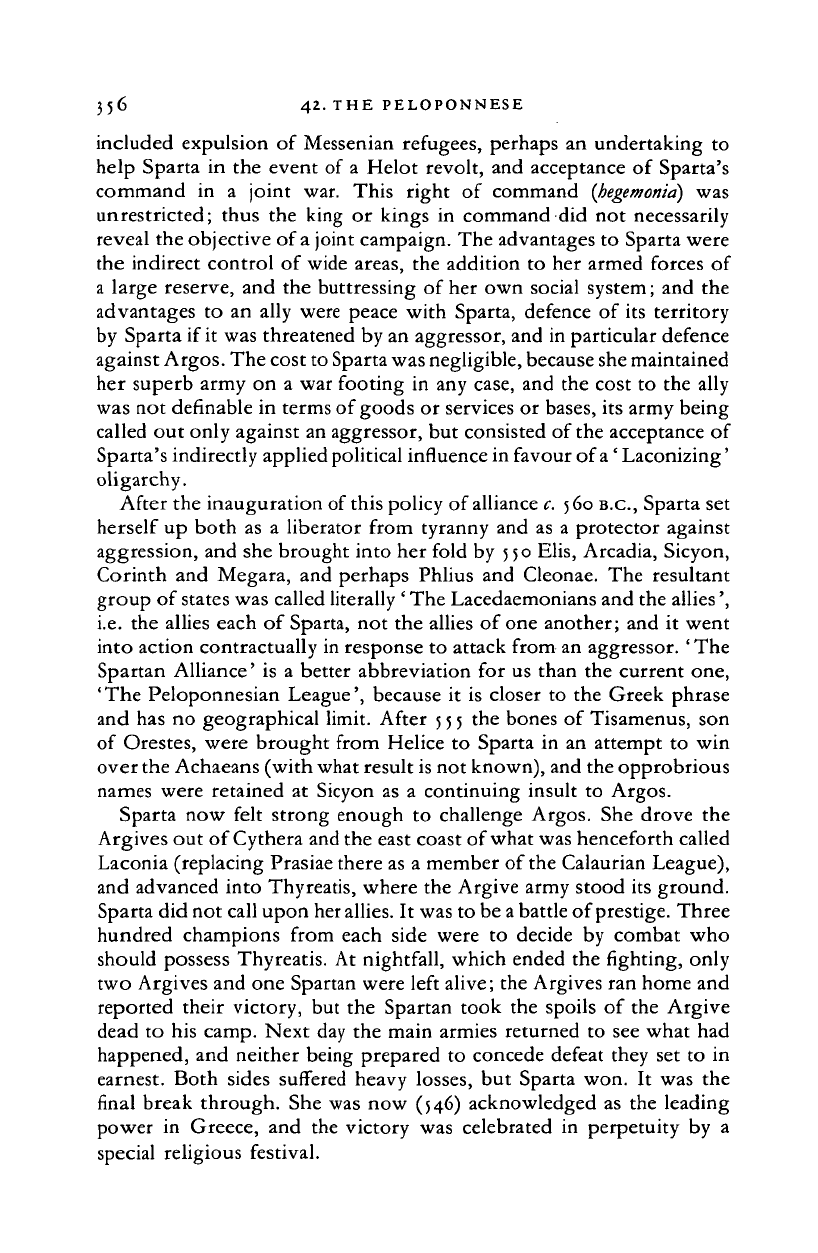
356 4
2
-
THE
PELOPONNESE
included expulsion of Messenian refugees, perhaps an undertaking to
help Sparta in the event of a Helot revolt, and acceptance of Sparta's
command in a joint war. This right of command
{hegemonid)
was
unrestricted; thus the king or kings in command did not necessarily
reveal the objective of
a
joint campaign. The advantages to Sparta were
the indirect control of wide areas, the addition to her armed forces of
a large reserve, and the buttressing of her own social system; and the
advantages to an ally were peace with Sparta, defence of its territory
by Sparta if it was threatened by an aggressor, and in particular defence
against Argos. The cost to Sparta was negligible, because she maintained
her superb army on a war footing in any case, and the cost to the ally
was not definable in terms of goods or services or bases, its army being
called out only against an aggressor, but consisted of the acceptance of
Sparta's indirectly applied political influence in favour of a 'Laconizing'
oligarchy.
After the inauguration of this policy of alliance
c.
560 B.C., Sparta set
herself up both as a liberator from tyranny and as a protector against
aggression, and she brought into her fold by 550 Elis, Arcadia, Sicyon,
Corinth and Megara, and perhaps Phlius and Cleonae. The resultant
group of states was called literally ' The Lacedaemonians and the allies',
i.e. the allies each of Sparta, not the allies of one another; and it went
into action contractually in response to attack from an aggressor. ' The
Spartan Alliance' is a better abbreviation for us than the current one,
'The Peloponnesian League', because it is closer to the Greek phrase
and has no geographical limit. After
5 5 5
the bones of Tisamenus, son
of Orestes, were brought from Helice to Sparta in an attempt to win
over the Achaeans (with what result is not known), and the opprobrious
names were retained at Sicyon as a continuing insult to Argos.
Sparta now felt strong enough to challenge Argos. She drove the
Argives out of Cythera and the east coast of what was henceforth called
Laconia (replacing Prasiae there as a member of the Calaurian League),
and advanced into Thyreatis, where the Argive army stood its ground.
Sparta did not call upon her
allies.
It was to be
a
battle of prestige. Three
hundred champions from each side were to decide by combat who
should possess Thyreatis. At nightfall, which ended the fighting, only
two Argives and one Spartan were left alive; the Argives ran home and
reported their victory, but the Spartan took the spoils of the Argive
dead to his camp. Next day the main armies returned to see what had
happened, and neither being prepared to concede defeat they set to in
earnest. Both sides suffered heavy losses, but Sparta won. It was the
final break through. She was now (546) acknowledged as the leading
power in Greece, and the victory was celebrated in perpetuity by a
special religious festival.
Cambridge Histories Online © Cambridge University Press, 2008
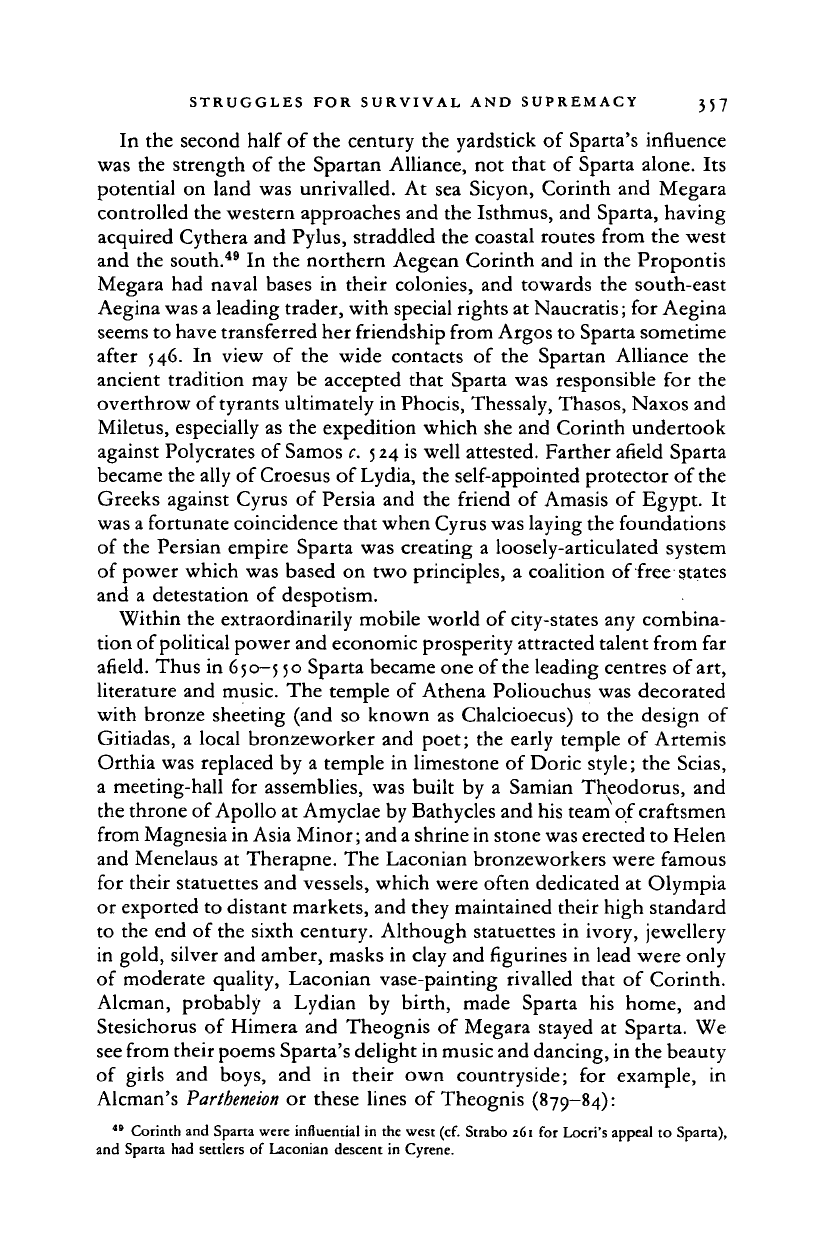
STRUGGLES FOR SURVIVAL AND SUPREMACY 357
In
the
second half
of
the century
the
yardstick
of
Sparta's influence
was
the
strength
of
the Spartan Alliance,
not
that
of
Sparta alone.
Its
potential
on
land
was
unrivalled.
At sea
Sicyon, Corinth
and
Megara
controlled the western approaches and the Isthmus, and Sparta, having
acquired Cythera and Pylus, straddled the coastal routes from the west
and
the
south.
49
In the
northern Aegean Corinth
and in the
Propontis
Megara
had
naval bases
in
their colonies,
and
towards
the
south-east
Aegina was a leading trader, with special rights at Naucratis;
for
Aegina
seems to have transferred her friendship from Argos to Sparta sometime
after
546. In
view
of the
wide contacts
of the
Spartan Alliance
the
ancient tradition
may be
accepted that Sparta
was
responsible
for the
overthrow of tyrants ultimately in Phocis, Thessaly, Thasos, Naxos and
Miletus, especially as
the
expedition which she and Corinth undertook
against Polycrates
of
Samos
c.
5 24
is well attested. Farther afield Sparta
became the ally
of
Croesus
of
Lydia, the self-appointed protector
of
the
Greeks against Cyrus
of
Persia
and the
friend
of
Amasis
of
Egypt.
It
was a fortunate coincidence that when Cyrus was laying the foundations
of the Persian empire Sparta was creating
a
loosely-articulated system
of power which was based
on
two principles,
a
coalition
of
free states
and
a
detestation
of
despotism.
Within
the
extraordinarily mobile world
of
city-states any combina-
tion of political power and economic prosperity attracted talent from
far
afield. Thus
in
650-550 Sparta became one
of
the leading centres
of
art,
literature
and
music.
The
temple
of
Athena Poliouchus was decorated
with bronze sheeting
(and so
known
as
Chalcioecus)
to the
design
of
Gitiadas,
a
local bronzeworker
and
poet;
the
early temple
of
Artemis
Orthia was replaced
by a
temple
in
limestone
of
Doric style;
the
Scias,
a meeting-hall
for
assemblies,
was
built
by a
Samian Theodorus,
and
the throne of Apollo
at
Amyclae by Bathycles and his team
of
craftsmen
from Magnesia in Asia Minor; and
a
shrine in stone was erected to Helen
and Menelaus
at
Therapne. The Laconian bronzeworkers were famous
for their statuettes and vessels, which were often dedicated
at
Olympia
or exported
to
distant markets, and they maintained their high standard
to
the end of
the sixth century. Although statuettes
in
ivory, jewellery
in gold, silver and amber, masks
in
clay and figurines
in
lead were only
of moderate quality, Laconian vase-painting rivalled that
of
Corinth.
Alcman, probably
a
Lydian
by
birth, made Sparta
his
home,
and
Stesichorus
of
Himera
and
Theognis
of
Megara stayed
at
Sparta.
We
see from their poems Sparta's delight in music and dancing, in the beauty
of girls
and
boys,
and in
their
own
countryside;
for
example,
in
Alcman's
Partheneion
or
these lines
of
Theognis (879-84):
" Corinth
and
Sparta were influential
in
the west
(cf.
Strabo 261
for
Locri's appeal
to
Sparta),
and Sparta
had
settlers
of
Laconian descent
in
Cyrene.
Cambridge Histories Online © Cambridge University Press, 2008
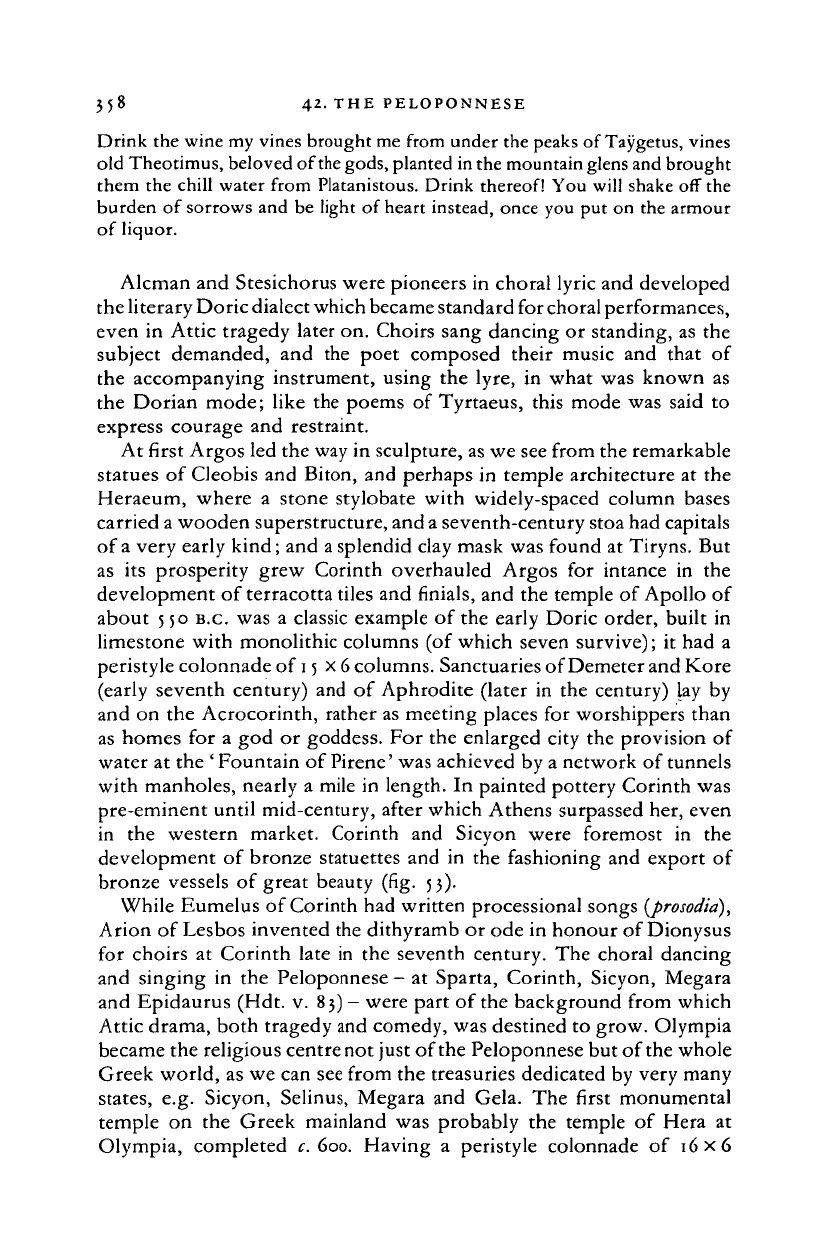
358 4
2
' THE PELOPONNESE
Drink the wine my vines brought
me
from under the peaks of
Taygetus,
vines
old Theotimus, beloved of
the
gods,
planted
in
the mountain
glens
and brought
them the chill water from Platanistous. Drink
thereof!
You will shake off the
burden of sorrows and be light of heart instead, once you put on the armour
of liquor.
Alcman and Stesichorus were pioneers in choral lyric and developed
the literary Doric dialect which became standard for choral performances,
even in Attic tragedy later on. Choirs sang dancing or standing, as the
subject demanded, and the poet composed their music and that of
the accompanying instrument, using the lyre, in what was known as
the Dorian mode; like the poems of Tyrtaeus, this mode was said to
express courage and restraint.
At first Argos led the way in sculpture, as we see from the remarkable
statues of Cleobis and Biton, and perhaps in temple architecture at the
Heraeum, where a stone stylobate with widely-spaced column bases
carried a wooden superstructure, and
a
seventh-century stoa had capitals
of
a
very early kind; and
a
splendid clay mask was found at Tiryns. But
as its prosperity grew Corinth overhauled Argos for intance in the
development of terracotta tiles and finials, and the temple of Apollo of
about
5
50
B.C.
was a classic example of the early Doric order, built in
limestone with monolithic columns (of which seven survive); it had a
peristyle colonnade of
15
x
6
columns. Sanctuaries of Demeter and Kore
(early seventh century) and of Aphrodite (later in the century) lay by
and on the Acrocorinth, rather as meeting places for worshippers than
as homes for a god or goddess. For the enlarged city the provision of
water at the 'Fountain of Pirene' was achieved by a network of tunnels
with manholes, nearly a mile in length. In painted pottery Corinth was
pre-eminent until mid-century, after which Athens surpassed her, even
in the western market. Corinth and Sicyon were foremost in the
development of bronze statuettes and in the fashioning and export of
bronze vessels of great beauty (fig. 53).
While Eumelus of Corinth had written processional songs
(prosodia),
Arion of Lesbos invented the dithyramb or ode in honour of Dionysus
for choirs at Corinth late in the seventh century. The choral dancing
and singing in the Peloponnese
—
at Sparta, Corinth, Sicyon, Megara
and Epidaurus (Hdt. v. 83)
—
were part of the background from which
Attic drama, both tragedy and comedy, was destined to grow. Olympia
became the religious centre not just of the Peloponnese but of
the
whole
Greek world, as we can see from the treasuries dedicated by very many
states,
e.g. Sicyon, Selinus, Megara and Gela. The first monumental
temple on the Greek mainland was probably the temple of Hera at
Olympia, completed c. 600. Having a peristyle colonnade of 16x6
Cambridge Histories Online © Cambridge University Press, 2008
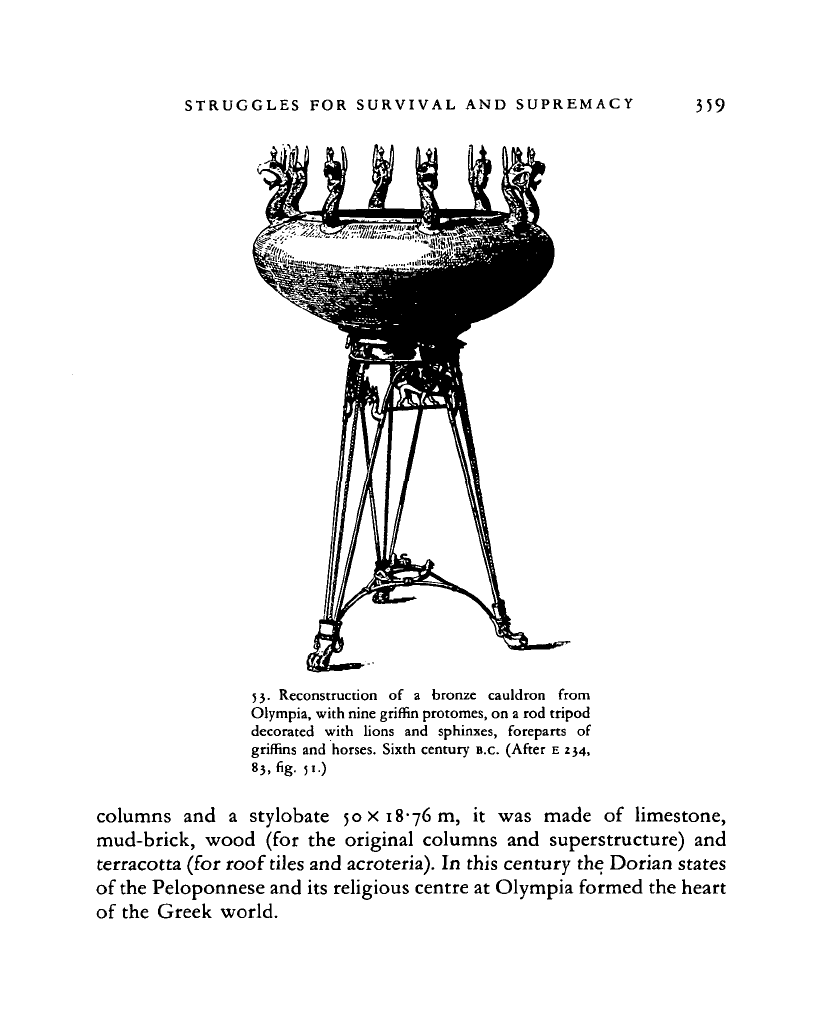
STRUGGLES FOR SURVIVAL AND SUPREMACY 359
53.
Reconstruction of a bronze cauldron from
Olympia, with nine griffin protomes, on a rod tripod
decorated with lions and sphinxes, foreparts of
griffins and horses. Sixth century B.C. (After E 234,
83,
fig. 51.)
columns and a stylobate 50 x 18-76 m, it was made of limestone,
mud-brick, wood (for the original columns and superstructure) and
terracotta (for roof tiles and acroteria). In this century the Dorian states
of the Peloponnese and its religious centre at Olympia formed the heart
of the Greek world.
Cambridge Histories Online © Cambridge University Press, 2008
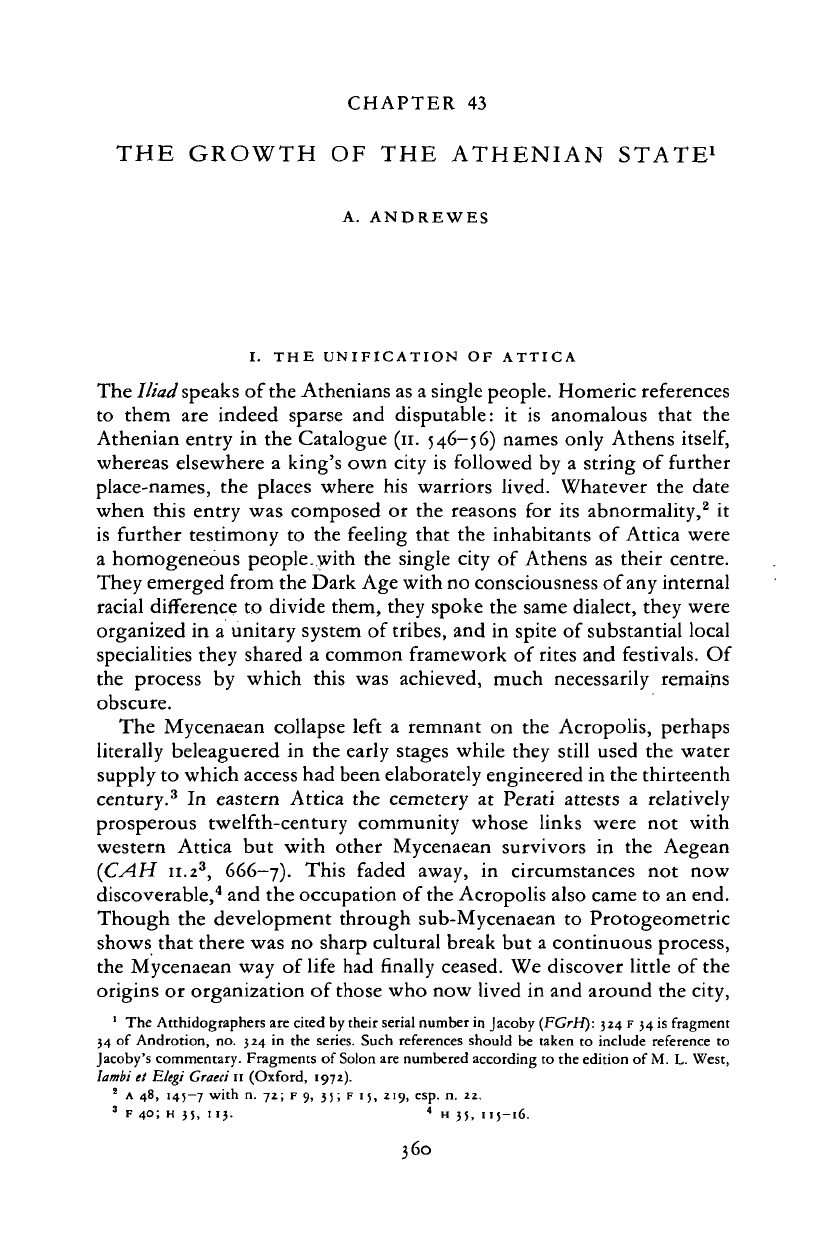
CHAPTER
43
THE GROWTH
OF THE
ATHENIAN STATE
1
A. ANDREWES
I. THE UNIFICATION OF ATTICA
The Iliad speaks of the Athenians as a single people. Homeric references
to them
are
indeed sparse
and
disputable:
it is
anomalous that
the
Athenian entry
in
the Catalogue (n. 546-56) names only Athens
itself,
whereas elsewhere
a
king's own city is followed by a string
of
further
place-names,
the
places where
his
warriors lived. Whatever
the
date
when this entry was composed
or
the reasons
for
its abnormality,
2
it
is further testimony
to
the feeling that the inhabitants
of
Attica were
a homogeneous people.with the single city
of
Athens as their centre.
They emerged from the Dark Age with no consciousness of any internal
racial difference to divide them, they spoke the same dialect, they were
organized in a unitary system of tribes, and in spite of substantial local
specialities they shared
a
common framework
of
rites and festivals.
Of
the process
by
which this was achieved, much necessarily remains
obscure.
The Mycenaean collapse left
a
remnant
on the
Acropolis, perhaps
literally beleaguered
in
the early stages while they still used the water
supply to which access had been elaborately engineered in the thirteenth
century.
3
In
eastern Attica the cemetery
at
Perati attests
a
relatively
prosperous twelfth-century community whose links were
not
with
western Attica
but
with other Mycenaean survivors
in the
Aegean
(CAH 11.2
3
, 666-7). This faded away,
in
circumstances
not
now
discoverable,
4
and the occupation of the Acropolis also came to an end.
Though the development through sub-Mycenaean
to
Protogeometric
shows that there was no sharp cultural break but a continuous process,
the Mycenaean way of life had finally ceased. We discover little
of
the
origins or organization of those who now lived in and around the city,
1
The Atthidographers arc cited by their serial number in Jacoby (FGrH): 324 F 34 is fragment
34
of
Androtion, no. 324
in
the series. Such references should
be
taken
to
include reference
to
Jacoby's commentary. Fragments of Solon are numbered according to the edition of M. L. West,
Iambi
tt
EiUgi Graeci
11
(Oxford, 1972).
2
A 48, 145—7 with
n.
72;
F 9,
3
j;
F
15, 219, esp.
n. 22.
4
H
35, nj-16.
360
Cambridge Histories Online © Cambridge University Press, 2008
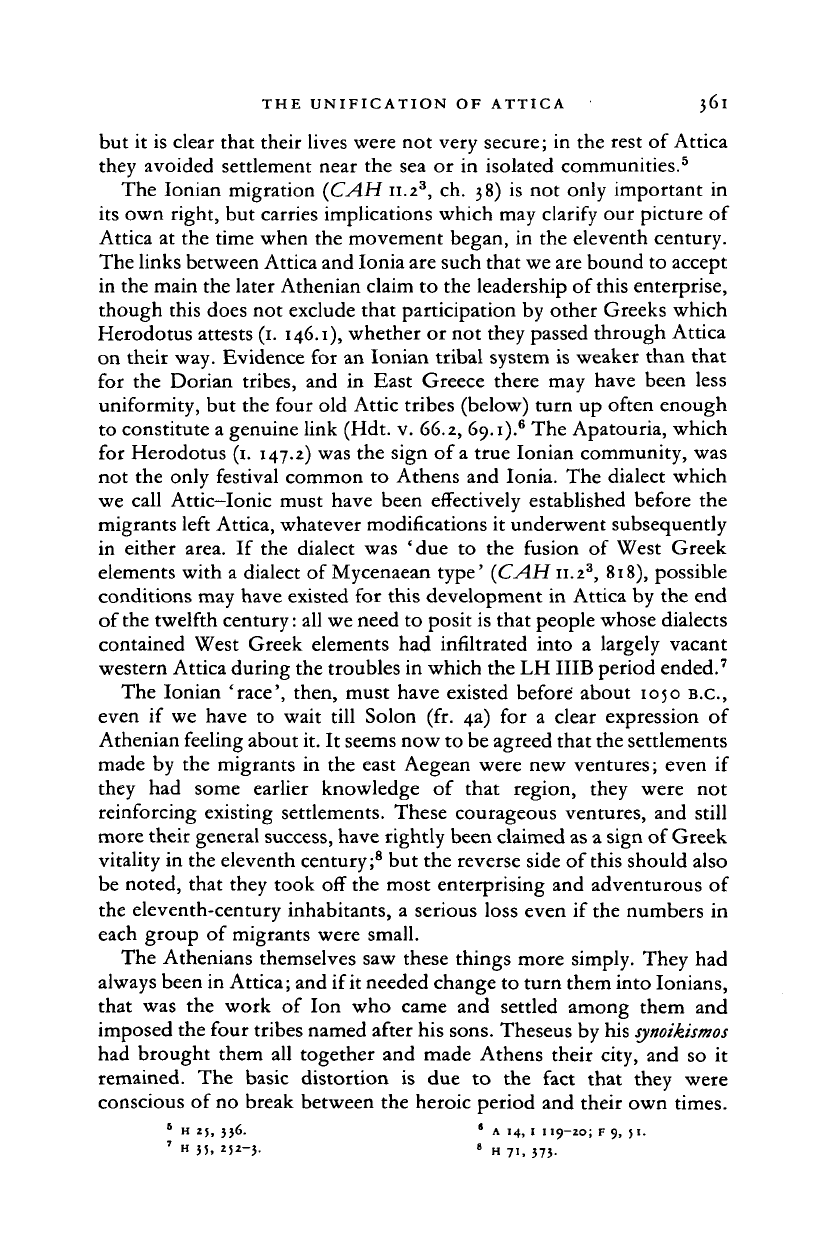
THE UNIFICATION OF ATTICA 361
but it is clear that their lives were not very secure; in the rest of Attica
they avoided settlement near the sea or in isolated communities.
5
The Ionian migration (CAH 11.2
3
, ch. 38) is not only important
in
its own right, but carries implications which may clarify our picture of
Attica at the time when the movement began, in the eleventh century.
The links between Attica and Ionia are such that we are bound to accept
in the main the later Athenian claim to the leadership of
this
enterprise,
though this does not exclude that participation by other Greeks which
Herodotus attests
(1.
146.1), whether or not they passed through Attica
on their way. Evidence for an Ionian tribal system is weaker than that
for the Dorian tribes, and
in
East Greece there may have been less
uniformity, but the four old Attic tribes (below) turn up often enough
to constitute a genuine link (Hdt. v. 66.2,
69. i).
6
The Apatouria, which
for Herodotus
(1.
147.2) was the sign of
a
true Ionian community, was
not the only festival common to Athens and Ionia. The dialect which
we call Attic-Ionic must have been effectively established before the
migrants left Attica, whatever modifications it underwent subsequently
in either area.
If
the dialect was 'due
to
the fusion
of
West Greek
elements with a dialect of Mycenaean type' (CA.H
11.2
3
,
818), possible
conditions may have existed for this development in Attica by the end
of
the
twelfth century: all we need to posit is that people whose dialects
contained West Greek elements had infiltrated into
a
largely vacant
western Attica during the troubles in which the LH IIIB period ended.
7
The Ionian 'race', then, must have existed before' about 1050 B.C.,
even
if
we have
to
wait till Solon
(fr.
4a)
for a
clear expression
of
Athenian feeling about it. It seems now to be agreed that the settlements
made by the migrants in the east Aegean were new ventures; even
if
they
had
some earlier knowledge
of
that region, they were
not
reinforcing existing settlements. These courageous ventures, and still
more their general success, have rightly been claimed as a sign of Greek
vitality in the eleventh century;
8
but the reverse side of this should also
be noted, that they took off the most enterprising and adventurous of
the eleventh-century inhabitants,
a
serious loss even
if
the numbers in
each group of migrants were small.
The Athenians themselves saw these things more simply. They had
always been in Attica; and if it needed change to turn them into Ionians,
that was the work
of
Ion who came and settled among them and
imposed the four tribes named after his sons. Theseus by his
synoikismos
had brought them all together and made Athens their city, and so
it
remained. The basic distortion
is due to the
fact that they were
conscious of no break between the heroic period and their own times.
6
H
2j, 3)6.
* A
14,
I
II9-20;
F 9, JI.
'
H
35,
252-3.
Cambridge Histories Online © Cambridge University Press, 2008
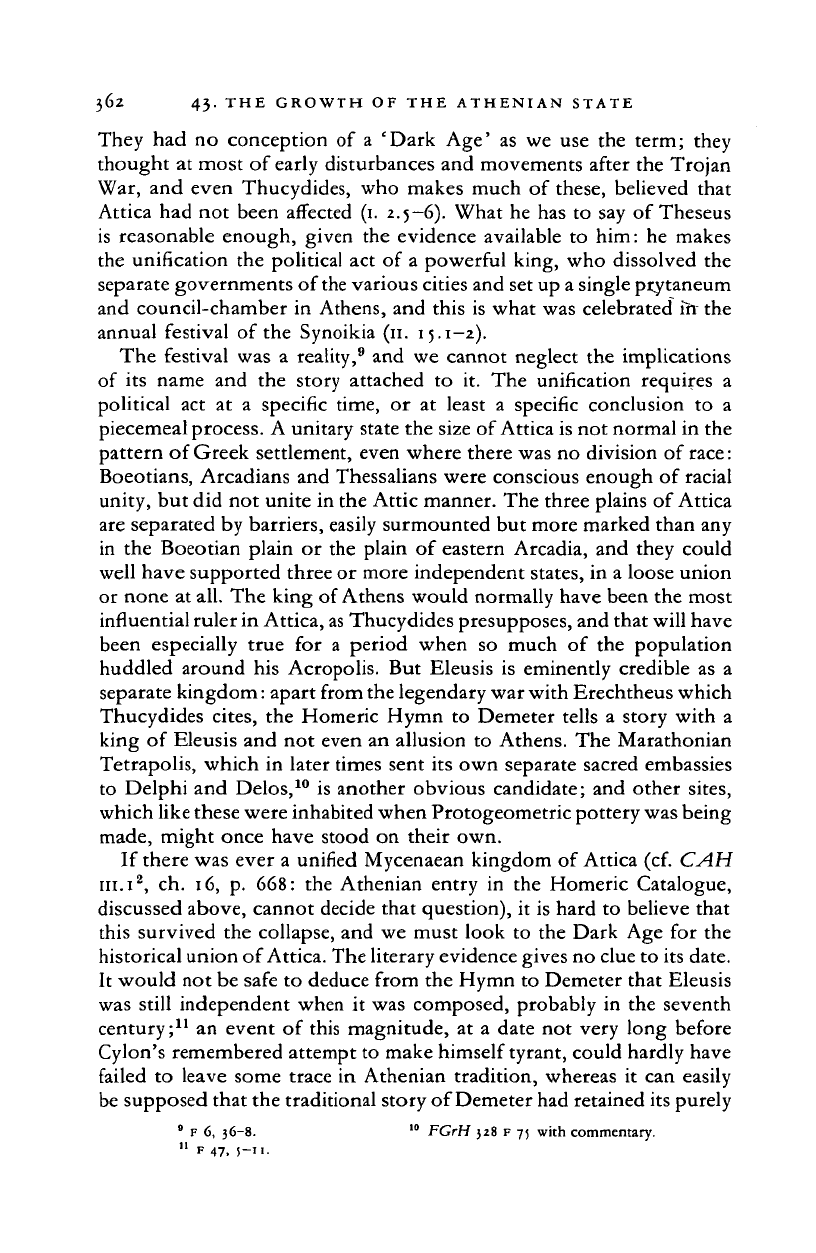
362 43-
THE
GROWTH OF THE ATHENIAN STATE
They had no conception of a 'Dark Age' as we use the term; they
thought at most of early disturbances and movements after the Trojan
War, and even Thucydides, who makes much of these, believed that
Attica had not been affected (1. 2.5—6). What he has to say of Theseus
is reasonable enough, given the evidence available to him: he makes
the unification the political act of a powerful king, who dissolved the
separate governments of the various cities and set up a single prytaneum
and council-chamber in Athens, and this is what was celebrated in the
annual festival of the Synoikia
(11.
15.1—2).
The festival was a reality,
9
and we cannot neglect the implications
of its name and the story attached
to
it. The unification requires
a
political act
at a
specific time, or
at
least
a
specific conclusion to
a
piecemeal process. A unitary state the size of Attica is not normal in the
pattern of Greek settlement, even where there was no division of race:
Boeotians, Arcadians and Thessalians were conscious enough of racial
unity, but did not unite in the Attic manner. The three plains of Attica
are separated by barriers, easily surmounted but more marked than any
in the Boeotian plain or the plain of eastern Arcadia, and they could
well have supported three or more independent states, in a loose union
or none at
all.
The king of Athens would normally have been the most
influential ruler in Attica,
as
Thucydides presupposes, and that will have
been especially true for a period when so much
of
the population
huddled around his Acropolis. But Eleusis is eminently credible as
a
separate kingdom: apart from the legendary war with Erechtheus which
Thucydides cites, the Homeric Hymn to Demeter tells a story with
a
king of Eleusis and not even an allusion to Athens. The Marathonian
Tetrapolis, which in later times sent its own separate sacred embassies
to Delphi and Delos,
10
is another obvious candidate; and other sites,
which like these were inhabited when Protogeometric pottery was being
made, might once have stood on their own.
If there was ever a unified Mycenaean kingdom of Attica (cf. CAH
in. i
2
, ch. 16, p. 668: the Athenian entry in the Homeric Catalogue,
discussed above, cannot decide that question), it is hard to believe that
this survived the collapse, and we must look to the Dark Age for the
historical union of
Attica.
The literary evidence gives no clue to its date.
It would not be safe to deduce from the Hymn to Demeter that Eleusis
was still independent when it was composed, probably in the seventh
century;
11
an event of this magnitude, at a date not very long before
Cylon's remembered attempt to make himself tyrant, could hardly have
failed to leave some trace in Athenian tradition, whereas it can easily
be supposed that the traditional story of Demeter had retained its purely
9
F
6,
36-8.
l0
FGrH
328 F 75
with
commentary.
11
F 47,
j—II.
Cambridge Histories Online © Cambridge University Press, 2008
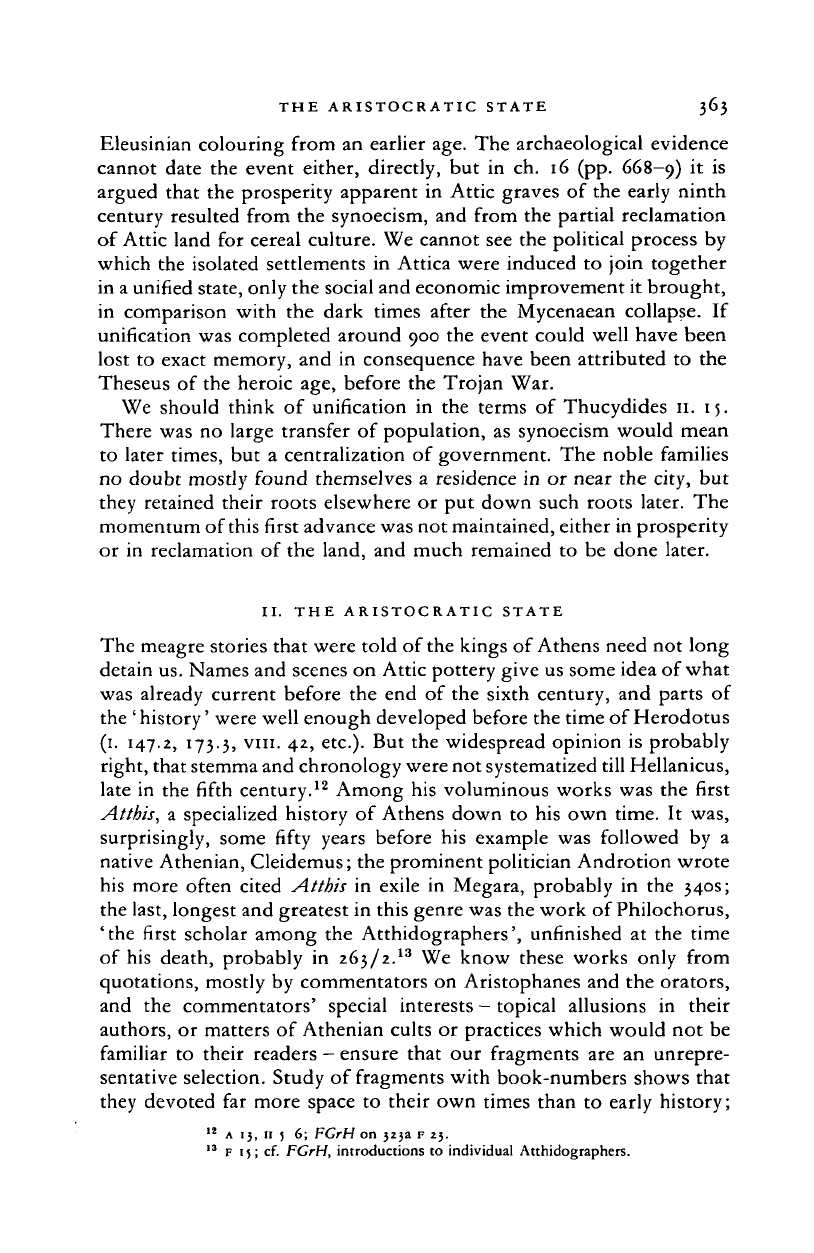
THE ARISTOCRATIC STATE 363
Eleusinian colouring from an earlier age. The archaeological evidence
cannot date the event either, directly, but
in
ch. 16 (pp. 668—9)
^
ls
argued that the prosperity apparent in Attic graves
of
the early ninth
century resulted from the synoecism, and from the partial reclamation
of Attic land for cereal culture. We cannot see the political process by
which the isolated settlements in Attica were induced
to
join together
in a unified state, only the social and economic improvement it brought,
in comparison with
the
dark times after the Mycenaean collapse.
If
unification was completed around 900 the event could well have been
lost to exact memory, and in consequence have been attributed
to
the
Theseus of the heroic age, before the Trojan War.
We should think
of
unification
in
the terms
of
Thucydides 11. 15.
There was no large transfer
of
population, as synoecism would mean
to later times, but
a
centralization
of
government. The noble families
no doubt mostly found themselves
a
residence in or near the city, but
they retained their roots elsewhere or put down such roots later. The
momentum of this first advance was not maintained, either in prosperity
or
in
reclamation
of
the land, and much remained
to
be done later.
II.
THE ARISTOCRATIC STATE
The meagre stories that were told of the kings of Athens need not long
detain us. Names and scenes on Attic pottery give us some idea of what
was already current before the end
of
the sixth century, and parts
of
the 'history' were well enough developed before the time of Herodotus
(1.
147.2,
173.3,
vin
- 4
2
> etc.). But the widespread opinion is probably
right, that stemma and chronology were not systematized till Hellanicus,
late in the fifth century.
12
Among his voluminous works was the first
Attbis,
a
specialized history
of
Athens down
to
his own time.
It
was,
surprisingly, some fifty years before his example was followed
by a
native Athenian, Cleidemus; the prominent politician Androtion wrote
his more often cited Attbis
in
exile
in
Megara, probably
in
the 340s;
the last, longest and greatest in this genre was the work of Philochorus,
'the first scholar among the Atthidographers', unfinished
at
the time
of his death, probably
in
263/2.
13
We know these works only from
quotations, mostly by commentators on Aristophanes and the orators,
and
the
commentators' special interests
-
topical allusions
in
their
authors, or matters of Athenian cults
or
practices which would not be
familiar
to
their readers
—
ensure that our fragments are
an
unrepre-
sentative selection. Study of fragments with book-numbers shows that
they devoted
far
more space
to
their own times than
to
early history;
12
A
1
j,
n
5
6;
FGrH on 323a F 23.
13
F
15;
cf.
FCrH,
introductions
to
individual Atthidographers.
Cambridge Histories Online © Cambridge University Press, 2008
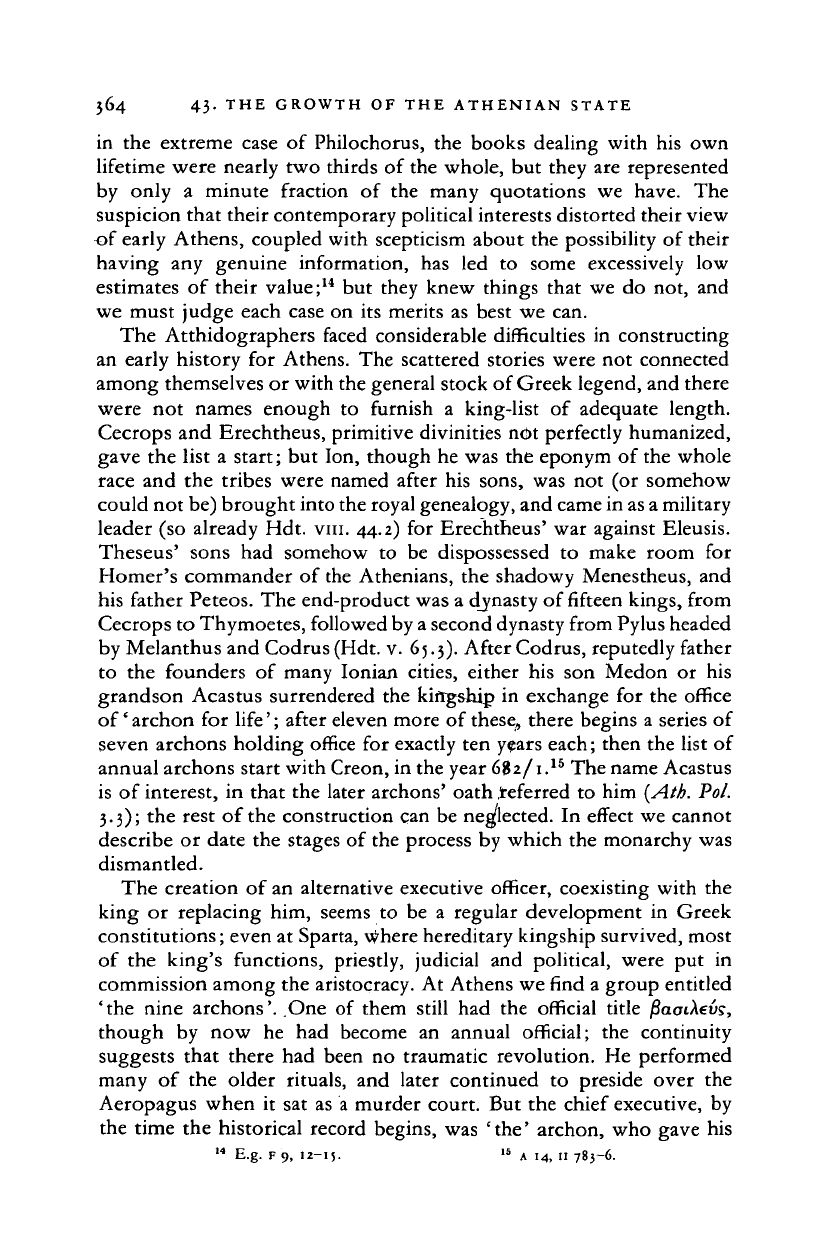
364 43-
THE
GROWTH OF THE ATHENIAN STATE
in the extreme case
of
Philochorus, the books dealing with his own
lifetime were nearly two thirds of the whole, but they are represented
by only
a
minute fraction
of
the many quotations
we
have.
The
suspicion that their contemporary political interests distorted their view
of early Athens, coupled with scepticism about the possibility of their
having
any
genuine information,
has led to
some excessively
low
estimates
of
their value;
14
but they knew things that we do not, and
we must judge each case on its merits as best we can.
The Atthidographers faced considerable difficulties
in
constructing
an early history for Athens. The scattered stories were not connected
among themselves or with the general stock of Greek legend, and there
were
not
names enough
to
furnish
a
king-list
of
adequate length.
Cecrops and Erechtheus, primitive divinities not perfectly humanized,
gave the list
a
start; but Ion, though he was the eponym of the whole
race and the tribes were named after his sons, was not (or somehow
could not be) brought into the royal genealogy, and came in as a military
leader (so already Hdt. vin. 44.2) for Erechtheus' war against Eleusis.
Theseus' sons
had
somehow
to be
dispossessed
to
make room
for
Homer's commander of the Athenians, the shadowy Menestheus, and
his father Peteos. The end-product was a d_ynasty of fifteen kings, from
Cecrops to Thymoetes, followed by a second dynasty from Pylus headed
by Melanthus and Codrus (Hdt. v. 65.3). After Codrus, reputedly father
to
the
founders
of
many Ionian cities, either
his
son Medon
or his
grandson Acastus surrendered the kiftgship in exchange for the office
of' archon for life'; after eleven more of these, there begins a series of
seven archons holding office for exactly ten years each; then the list of
annual archons start with Creon, in the year
682/1.
18
The name Acastus
is of interest, in that the later archons' oath .referred
to
him {Ath. Pol.
3.3); the rest of the construction can be neglected. In effect we cannot
describe
or
date the stages of the process by which the monarchy was
dismantled.
The creation of an alternative executive officer, coexisting with the
king
or
replacing him, seems
to be a
regular development
in
Greek
constitutions; even at Sparta, v^here hereditary kingship survived, most
of the king's functions, priestly, judicial
and
political, were
put in
commission among the aristocracy. At Athens we find a group entitled
'the nine archons'. One
of
them still had
the
official title fiaoiXevs,
though
by now he had
become
an
annual official;
the
continuity
suggests that there had been no traumatic revolution. He performed
many
of
the older rituals,
and
later continued
to
preside over
the
Aeropagus when
it
sat as a murder court. But the chief executive,
by
the time the historical record begins, was 'the' archon, who gave his
14
E.g. F
9,
12-15.
1S
A
14, 11 783-6.
Cambridge Histories Online © Cambridge University Press, 2008
